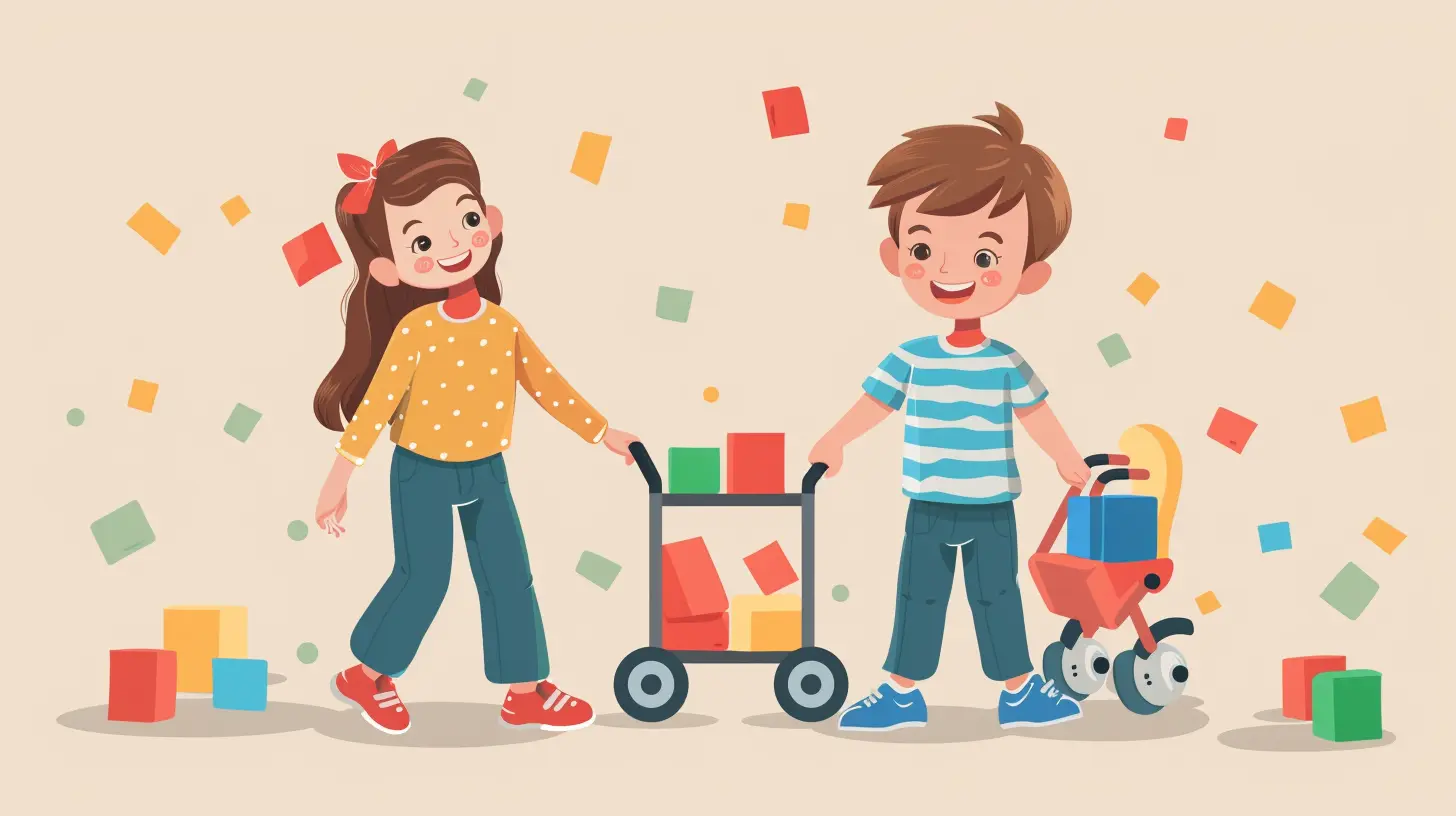Handling Sibling Dynamics When One Child Has Special Needs
5 November 2025
Let’s be real—raising kids is already a wild ride. Add in the unique needs of one child, and it’s like you’ve been handed a parenting puzzle with a few extra tricky pieces. When one of your children has special needs, balancing the emotional, mental, and physical energy between all your kids gets a lot more complicated. Sibling dynamics can shift, evolve, and sometimes feel a little out of control.
But here’s the thing: you’re not alone. Plenty of families are navigating these waters—you’re just trying to steer the ship in a way that ensures everyone feels seen and loved. In this article, we’re going to break down how to handle those sibling dynamics in a way that fosters understanding, connection, and a whole lot of love.

The Reality of Family Life With a Special Needs Child
First off, let’s acknowledge the elephant in the room—when one child requires more time, attention, or care because of physical, developmental, or emotional differences, the other kids feel it. They see it. And yep, they have thoughts about it.Maybe your neurotypical child gets frustrated because their sibling is having a meltdown in the middle of Target (again). Or they might feel jealous, left out, or even guilty for being able to do things more easily.
Sound familiar?
This doesn’t mean you’re failing as a parent—it just means your family is experiencing something deeply human.

How Siblings View the Situation
Kids are incredibly intuitive, but their understanding of complex topics is still developing. That can make things tricky. Your child who doesn’t have special needs might wonder…- “Why does my sister get more attention?”
- “How come I always have to wait?”
- “Why can’t we just be a normal family?”
And while these thoughts might sound selfish at first glance, they’re actually totally natural. These aren’t signs of selfishness—they’re signs your child is trying to make sense of their world.

Common Challenges in Sibling Dynamics
Let’s dive into some of the common bumps in the road when one child has special needs:1. Jealousy & Resentment
It’s hard for kids to understand why their sibling gets more of your time or seemingly "special treatment." To them, it's like someone else always gets the bigger slice of the birthday cake.2. Parentification of the Neurotypical Child
Sometimes siblings take on an unintended caregiving role. They may feel like it's their job to support or protect their sibling constantly. That’s a lot of pressure for young shoulders.3. Feeling Invisible
Kids may feel overlooked when a lot of the family’s resources are naturally directed toward the child with special needs. Even if you don’t mean to, it can feel like they’re waiting in the wings while the spotlight shines elsewhere.4. Social Isolation and Embarrassment
Even though they love their sibling, children can feel embarrassed in public or excluded socially because their family operates differently than others.These challenges are real—but they’re not the end of the story. There are ways to navigate this. Let’s talk about them.

Strategies to Nurture Healthy Sibling Relationships
Now for the good stuff—the practical, heart-centered ways to support all your kids, no matter their needs or challenges.1. Open Up the Conversation (Regularly)
Honest, age-appropriate communication is gold. Sit your kids down and talk about their sibling’s needs. Explain things in terms they can grasp. Use books, videos, or even role-play if that helps.Ask how they’re feeling. Listen—really listen—even if what they say is hard to hear. Sometimes, just giving them space to share can make a world of difference.
Try saying:
“Hey buddy, I know sometimes it feels like your brother gets more attention. That must be really hard. Want to talk about it?”
2. Create One-on-One Time With Each Child
Yes, your time is stretched thinner than ever, but carving out even 15-20 minutes of solo time with your other children can be powerful. Go for ice cream together, play a quick board game, or take a walk. This tells them, “You matter too.”You don’t need to make it a huge production—just be present, be there.
3. Encourage Their Own Identity
It’s easy for siblings of special needs kids to feel like they’re defined by that role. Help them discover who they are outside of being a brother or sister.Support their hobbies. Celebrate their accomplishments. Make space for them to shine in their own light—not just as someone else’s sibling.
4. Set Realistic Expectations
Kids often mimic the adults around them. If you expect them to be endlessly patient or mature beyond their age, they might try—but it's not sustainable.Let them be kids. Let them have messy feelings and imperfect reactions. Guide them through it, but don’t expect perfection.
5. Include Them in the Journey
Depending on their age, involve your child in managing their sibling’s care—but only where it feels appropriate. This can help them understand more deeply and feel less like outsiders.Maybe they help pick out therapy toys or read a book together. Maybe they attend a sibling support group. Involvement can lead to empathy—without turning into a burden.
6. Celebrate the Sibling Bond
Look for those moments—however small—where your kids connect. Maybe it’s a shared laugh, a hug, or one helping the other. Point it out.“Did you see how you helped calm your sister down? She looks up to you so much.”
These moments are the glue that holds sibling relationships together.
Real Talk: What If the Relationship Is Strained?
Not every sibling dynamic is sunshine and rainbows. And sometimes, despite your best efforts, your kids just don’t get along—especially when one child has unique behavioral or cognitive differences.That’s okay. It doesn't mean they'll never bond. Relationships shift over time.
In the meantime:
- Keep laying the foundation for empathy and respect.
- Model kindness and inclusion.
- Be patient. Sometimes, love grows slowly.
When to Seek Outside Help
There’s absolutely no shame in asking for support. If your neurotypical child is showing signs of anxiety, depression, or chronic behavioral issues, it might be time to loop in a professional.Here are some resources that can make a difference:
- Family therapy
- Sibling support groups (online or in-person)
- School counselors
- Books specifically written for siblings of children with special needs
Often, just knowing they’re not alone is healing.
Don’t Forget About Yourself
You’re the captain of this ship, and while you’re busy making sure no one hits an iceberg, you need to take care of your own emotional wellbeing too.Guilt, exhaustion, and self-doubt are frequent flyers in this parenting situation. Give yourself grace. You’re doing the best you can with what you have—and that’s more than enough.
Lean on your village—friends, family, your partner, online communities. Vent when you need to. Rest when you can. And remember, your emotional health sets the tone for your family.
A Note to Your Children (If They Could Read This Someday)
If we could write something to the siblings of special needs kids, it might go something like this:"You are brave. You are compassionate. And you’re allowed to feel all your feelings—even the messy ones. Your role in this family matters. You’re deeply loved, and your presence changes the world in ways you may not even understand yet."
Final Thoughts
Handling sibling dynamics when one child has special needs isn’t about achieving perfect balance—it’s about creating an environment where every child feels safe, loved, and supported.There will be tears. There will be laughter. And through it all, there will be love.
You’ve got this, even when it feels like you don’t. Keep the lines of communication open, nurture each child as the unique person they are, and remember that even the rockiest relationships can become the strongest over time.
Let’s Keep the Conversation Going
What are some ways you help your kids bond and balance sibling dynamics in your home? Share your stories in the comments—or pass this along to another parent who could use some encouragement today.all images in this post were generated using AI tools
Category:
Special NeedsAuthor:

Noah Sawyer
Discussion
rate this article
1 comments
Carmel McCune
Great insights! Balancing sibling dynamics can be tricky, but fostering empathy and open communication makes all the difference. Your tips are incredibly helpful for nurturing strong bonds and understanding among siblings. Thanks for sharing!
November 15, 2025 at 6:03 PM

Noah Sawyer
Thank you for your kind words! I'm glad you found the tips helpful for fostering understanding and empathy among siblings.


